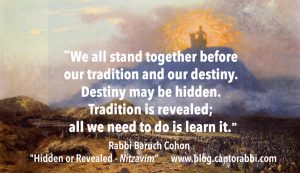HIDDEN OR REVEALED – Nitzavim – Deut. 29:9–30:20, by Rabbi Baruch Cohon
We always read this section of Moses’ final discourse at the end of our calendar year. Approaching Rosh Hashana, our yom ha-din – Day of Judgment – we review the principles and the warnings Moses gave us.
At the end of Chapter 29, he says: “What is hidden belongs to G-d, and what is revealed belongs to us and our children.” Both good and evil can be either Hidden or Revealed.
Commenting on this line, the Klee Yokor brings it down to cases. Quoting an earlier passage, he asks: If an individual takes the self-centered attitude “I’ll be all right, I’ll just follow my own stubbornness,” who knows what that mind is hiding? Only G-d knows. And if that individual’s stubborn actions bring destruction on his community – as the Torah says “sweeping away the wet with the dry” or, as Maimonides interprets it, “adding drunkenness to thirst” – G-d will punish the perpetrator.
On the other hand, should a family or an entire tribe commit sin, it cannot be hidden. The entire nation must deal with the offenders, carrying out the principle that “what is revealed belongs to us and our children forever.” If the offenders are not expelled from the land, judgment will fall on the nation, and all will be scattered because of the sins of that tribe.
Sins bring consequences, whether those sins are hidden or revealed.
What sins incur exile? Clearly, idolatry is one of the primary sins. What about denial of G-d? Sexual perversion? Political treason? For that matter, what about murder? Theft? Bearing false witness? They are all prohibited in the Torah, just like idolatry. Are we to look at our tragic and heroic history and conclude that we brought all the calamity on ourselves?
Certainly we and our ancestors had plenty of enemies to help bring on the calamities of exile and persecution and massacre. What we lacked then, and still lack again today, is the unity of a nation. We cannot join hands and punish or banish those whose actions threaten our communities. Many times, we cannot even agree on the danger of those actions. Is it right or wrong to erect settlements on land that another group wants – even if that land was conquered in a fair fight? Is it right or wrong to stage Gay Pride parades in a country that grants marriage authority exclusively to Orthodox rabbis?
Those are just some Israeli questions. Living in many other parts of the world as we do, local Jewish communities face all kinds of questions about positive or destructive conduct that can range from political activity to dealing with official rulings affecting Jewish life – whether circumcision or kashrut or the basic freedom to attend synagogues safely.
Again, Nitzavim offers an answer. Not always an easy answer, but a guiding principle. It gives us Moses’ injunction to his people: “Not with you alone do I make this covenant, but with all who are here with us today, and with those who are not here with us today.” Who was not there? Future generations, including us. We all stand together before our tradition and our destiny. Destiny may be hidden. Tradition is revealed; all we need to do is learn it.
Approaching a New Year, we must consider how we can stand together. Like Moses’ audience, we do many different things. We are “your heads, your tribes, your elders, your officers… your woodcutters and your water-drawers.” Your corporate executives, your scientists and technicians, your rabbis and teachers, your labor-union members and your journalists, your storekeepers and your artists. Your soldiers and your sailors, your intelligence officers and your students, your airline pilots and your taxi drivers, your shepherds and your entertainers. With all our differences, we share our Jewish identity, and we share something even more basic: we share our hope for the future. Tradition and destiny. Hidden and revealed.
Let’s stand together.



